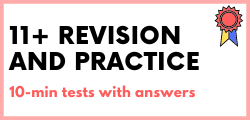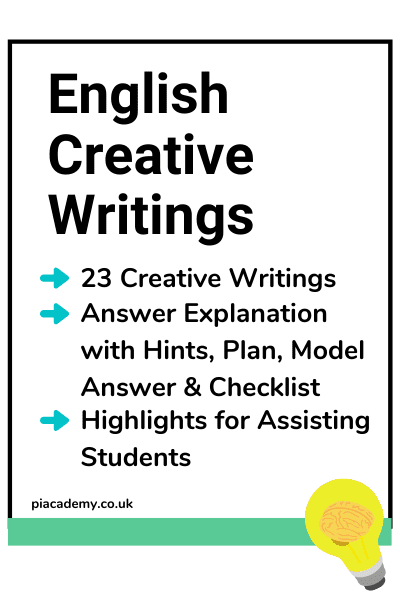Spelling, punctuation and grammar are important to students taking the 11+ exams. Understanding the common English mistakes early - and how not to make them - will prevent them from becoming a habit.
It is reported that 50% of Britons struggle with the correct use of the apostrophe. By committing to practice, your child can beat much of the competition when they take the eleven plus, just by learning simple rules for the correct use of English.
There are two sections of most 11 plus exams that your child will benefit from by developing SPaG. One of those is the English section and the other is the verbal reasoning part.
- Some of the skills needed to be good at SPaG will help children answer these questions correctly.
- However, the questions in the 11 plus exam usually push the boundaries of what is taught in school.
- In fact, most if not all the verbal reasoning questions will not even be looked at in your child’s classroom.
For this reason, SPaG will help with attempting the 11+ exam enormously.
Here are five different ways to improve your child’s SPaG – in ways that are easier than you can imagine.
Slow writing
Slow writing is an easy but effective way to help improve your child’s SPaG. Children are given a checklist with a range of key points they have been learning – a proper noun, speech, simile, passive language and so on.
This means each sentence they write – creating a complete piece of work – will have a specific feature focus. There are a few reasons why this is beneficial:
- This "slow" writing encourages children to take their time to use different grammar, punctuation or language features in their writing, while also focusing on the text type they have already been developing.
- If you are focusing on a specific type of writing, such as stories, you might focus solely on speech, expanded noun phrases and semicolons.
- If you were focusing on newspapers, you might focus on features like passive voice, time adverbials and relative clauses.
It also gives a perfect time for parents to spend some time checking their child’s understanding and checking their SPaG.
Reading
Reading is one of the best ways to help your child improve their grammar skills. In fact, when kids read a book they enjoy, they can see how the author composed their sentences and used specific grammar for effect:
- This not only shows them how to use grammar correctly but helps when it comes to understanding why it’s been used.
- As well as improving grammar, reading is also a fun and enjoyable activity
- It will help improve all aspects of your child’s writing skills, including sentence structure and increased vocabulary.
Getting students to read aloud is important if you want them to improve their SPaG. This will become clear to you when you sit and read with your child. They might mispronounce certain words, and might
Their work was full of SPaG errors, which I had not marked at all. As they read, they began to realise most of their mistakes: spelling, punctuation and grammar. The act of reading aloud was central to them realising their errors.
From that time onwards, I asked my students to read their work to each other in pairs or groups on a regular basis and found that if I asked them to stop and correct their work when appropriate, this had amazingly good results.
While decontextualized tests can have their place, the overwhelming evidence is that pupils learn to spell, punctuate and discuss grammar when they are reading ‘real’ pieces of writing and exploring ‘real’ situations.
Use SPaG Games
A lot of experienced English teachers have argued that games are not just time-filling activities, but they have a great educational value. The reason? Simple. We hold that most grammar games make learners use the language instead of thinking about learning the correct forms.
There are many advantages of using games in spelling and grammar:
- Games can lower anxiety, thus making the learning of key skills more interesting
- Games are highly motivating and entertaining, and they can give shy students more opportunities to express their opinions and feelings
- They also enable learners to acquire new experience that are not always possible during a typical lesson
- Games add diversion to the regular classroom activities, break the ice and introduce the new ideas
- In the easy, relaxed atmosphere which is created by using games the students remember things faster and better
- Grammar games are a good way of practicing language, as they provide a model of what learners will use the language for in real life
Here are a few examples to get you started:
GRAMMAR TRUTH OR DARE
Get students to review basic skills and apply concepts important to reading and writing with a friendly game of Truth or Dare.
Truth prompts can be considered basic review questions. Example: Explain the debate about the Oxford comma.
Conversely, Dare prompts might be harder questions or silly challenges. Go deeper with application when possible. Example: Give a one-minute monologue about everyone in your family without using any names – only pronouns!
REVISION GRAMMAR AND WRITING GAME
If your students need to revise and edit their writing, integrate grammar. Put together a game board with the skills you want students to focus on. For example, students might look for comma errors, sentence variety, and parallel structure.
When it is a student’s turn, allow him or her to select the square from the game board they want to complete. As they revise their essays, students can colour-code their changes with corresponding prompts on the game board.
DICE REVIEW
At the end of a unit, review key concepts with a dice game. They usually enjoy adding a little flair to parts of speech and types of sentences, for instance. Have students play in small groups or with partners to keep skills fresh and add accountability
SPaG games encourage, entertain, teach, and promote fluency, so try using them with your child today.
Assess
One of the best ways to assess SPaG productively is to write pupils’ errors on one ‘assessment’ sheet while you are checking through their writing. This might seem intimidating to parents, but it's pretty simple:
- Get students to re-read their work to see where they made them, asking them to
correct their errors. This makes them acquire the vital skill of proof-reading and saves you a great deal of time too.
- One of the problems with marking every single piece of work for SPaG errors is that pupils don’t learn to look for mistakes themselves but expect the parents to do this.
- The key point is to gain a central record of errors/issues and then systematically target addressing them in your subsequent lessons.
If you don’t want to spend time making your own assessments, there are plenty of alternatives available for you. You should take a look at PiAcademy’s selection of exam papers and assessments. All of them are built to mirror exact 11+ exams, including English past papers, mocks and courses to help with all elements of the exam, not just SPaG.
Proofread…out loud
Sometimes when we re-read pieces we have written, our brain fills in the gaps of missing information. We do not always catch our own mistakes when we proofread. Reading what you have written out loud, preferably to someone else, is an efficient way to evaluate whether or not you have used correct grammar:
- You are more likely to notice your errors if you read the content aloud, rather than in your head to yourself.
- It builds confidence as the student has to talk through the reasons why they made the mistakes/used spelling and grammar effectively.
- This should build a habit which can be transferred over to the classroom, leading to more progress overall.
Get into this habit with your child, and you will notice a powerful difference in their SPaG abilities.
Reading backwards is especially good for spotting spelling errors. Reading your text backwards, word by word can sometimes help you to notice spellings because it forces you to look at each word in isolation.
Even just proofreading for just one kind of error at a time. Perhaps you already know what kind of mistakes you are likely to make, so begin by looking out for these. Some of the most common mistakes involve getting mixed up.
Or give your child a proofreading routine: begin with punctuation and capital letters; then sentence structure; then think about spelling.
Remember… Proofreading is often easiest when there is a gap between writing and reading your work. So take a break before starting!


















































